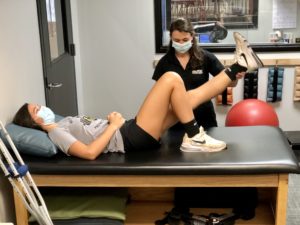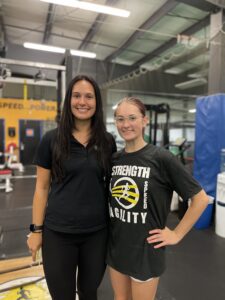Expect to Get Better…And You Probably Will!
Research has shown that positive expectations increase the chances of a good outcome. It’s the old self fulfilling prophecy; your attitude determines your approach to situations. If you believe you’ll be successful, you’ll likely put in more effort. You’ll be more willing to try new things, take some risks and keep trying after failures or setbacks. A negative attitude will likely mean that you’ll take your first failure or setback as confirmation that what you’re trying won’t work or isn’t possible and you’ll give up. Why waste time and effort on something that’s doomed to failure anyway?
Your Expectations Influence Your Results
 There’s some research to prove that positive thinking and expectations make a difference in rehab settings, too. A review of 23 articles looking at outcomes for shoulder pain found a few interesting things. First, patients who expected to recover and believed that they had some control of the outcome, ended up doing better than those who didn’t. Second, optimistic patients were found to have less pain and disability after completing rehab. Third, patients who believed they’d have pain and disability after surgery tended to have – you guessed it – pain and disability after their surgery. Research says that you tend to get what you expect.
There’s some research to prove that positive thinking and expectations make a difference in rehab settings, too. A review of 23 articles looking at outcomes for shoulder pain found a few interesting things. First, patients who expected to recover and believed that they had some control of the outcome, ended up doing better than those who didn’t. Second, optimistic patients were found to have less pain and disability after completing rehab. Third, patients who believed they’d have pain and disability after surgery tended to have – you guessed it – pain and disability after their surgery. Research says that you tend to get what you expect.
Your Therapist’s Attitude Matters, Too
Your attitude is important, but what about your therapist’s attitude? There isn’t much research specific to PT, but there is a study done in elementary schools that might give us some clues. Two psychologists – Rosenthal and Jacobs – did a study showing that teacher expectations had an influence on student performance. They told teachers that randomly selected students in their classes were tested and found to be “late bloomers.” These students were expected to show large improvements in academic performance during the school year. When the students were tested 8 months later, the students the teachers believed would improve the most, did. Why? When teachers think students have a lot of potential to improve, they hold them to higher standards. They teach more complex materials, don’t settle for simplistic answers and are more willing to spend time instructing and working with those students. It’s pretty easy to see how this could cross over into a PT clinic. If your PT thinks you can get better, they’ll probably put more effort into designing your program, spend more time with you and push you harder than someone they don’t believe has a lot of room for improvement. To have the best chance for a good outcome, you and your therapist both need to expect one. You probably will.
psychologists – Rosenthal and Jacobs – did a study showing that teacher expectations had an influence on student performance. They told teachers that randomly selected students in their classes were tested and found to be “late bloomers.” These students were expected to show large improvements in academic performance during the school year. When the students were tested 8 months later, the students the teachers believed would improve the most, did. Why? When teachers think students have a lot of potential to improve, they hold them to higher standards. They teach more complex materials, don’t settle for simplistic answers and are more willing to spend time instructing and working with those students. It’s pretty easy to see how this could cross over into a PT clinic. If your PT thinks you can get better, they’ll probably put more effort into designing your program, spend more time with you and push you harder than someone they don’t believe has a lot of room for improvement. To have the best chance for a good outcome, you and your therapist both need to expect one. You probably will.
If you’re dealing with a new or nagging injury or are recovering from a recent surgery, choosing the right Physical Therapy clinic is one of the most important decisions you need to make. Like any organization, not all PT clinics are the same! Our expert Physical Therapists in Stoughton and Foxboro have the skills, experience, and POSITIVE ATTITUDE to help you achieve your goals and get back to doing the things you enjoy! To learn more about Physical Therapy at Elite, visit us HERE or give us a call at 781-297-0979 in Stoughton or 774-215-5401 in Foxboro to schedule an appointment today. To schedule online, please visit HERE to register via our online patient portal.
References
● De Baets L, Matheve T, Meeus M, Struyf F, Timmermans A. The influence of cognitions, emotions and behavioral factors on
treatment outcomes in musculoskeletal shoulder pain: a systematic review. Clin Rehabil. 2019 Jun;33(6):980-991. doi:
10.1177/0269215519831056. Epub 2019 Feb 22. PMID: 30791696.
● Rosenthal, R, and L. Jacobsen. Pygmalion in the classroom: teacher expectation and pupils’ intellectual development. New
York: Holt, Rinehart and Winston, 1968.
